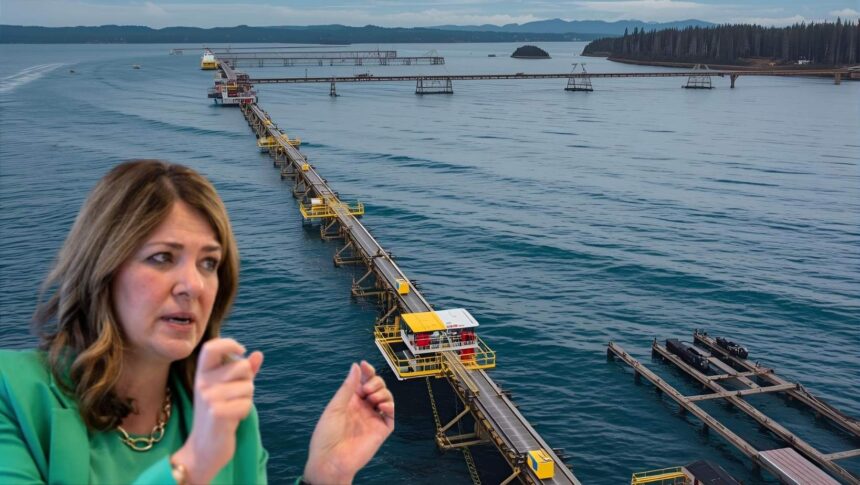Alberta Premier Danielle Smith said her government will act as the initial proponent for a crude oil pipeline to Canada’s Pacific coast and has set aside C$14 million for early regulatory work, Indigenous engagement, and route scoping.
An advisory group with representatives from Enbridge, Trans Mountain, and South Bow will help shape the submission, which Alberta aims to file in the spring.
Smith stressed the province does not intend to finance construction and wants private capital and potential First Nations ownership to carry the project if it advances.
British Columbia’s Premier David Eby dismissed the announcement as political theater without a private-sector backer. “There is no proponent.
There is actually no project here,” he said, adding that his government is willing to work on initiatives with real commercial sponsors.
Smith countered that diversifying Canada’s oil exports beyond the United States is an economic imperative and framed the effort as a chance to correct past decisions that stymied northern routes.
She has repeatedly pointed to Prince Rupert as the preferred tidewater.
A pipeline to the north coast would collide with a central legal barrier: the federal Oil Tanker Moratorium Act, also known as Bill C-48, which prohibits tankers carrying large volumes of crude and persistent oils from calling at ports along B.C.’s northern coastline.
Smith said the project would require either a repeal of the law or a carve-out for the port that hosts any terminal.
Coastal First Nations leaders have already signaled resistance, citing spill risk and a lack of consent.
Regulatory path now runs through Ottawa’s new office
The province plans to apply to the federal Major Projects Office, created this year to coordinate reviews and shrink timelines for projects deemed in the national interest.
Ottawa says the office is intended to offer a single set of conditions and a maximum two-year federal review for designated proposals.
Early projects named by the government for consideration include LNG, mining, ports, and nuclear power; an Alberta-to-Pacific oil line would need to secure a place on that list.
Trans Mountain system has already absorbed near-term export growth and whether a second coast-bound line would win social license where the canceled Northern Gateway failed.
Alberta argues that early and sustained engagement, including potential Indigenous equity, can change the equation, and that an Asian-facing outlet could sharpen Canadian barrels’ price realizations.
None of that addresses the tanker prohibition, which remains in force on the north coast and has been central to past court and political fights.
Alberta has not filed a route, cost estimate, capacity, or terminal location, and there is no private proponent on record.
The government’s C$14 million is intended to assemble the technical groundwork and consultation needed to test Ottawa’s new approval regime.
Whether the plan becomes a bankable pipeline or a bargaining chip in interprovincial politics will hinge on three variables that markets will watch closely: federal willingness to revisit the tanker law, depth of Indigenous and community partnerships along any corridor, and evidence of shipper commitments strong enough to underwrite a multi-billion-dollar build.




















